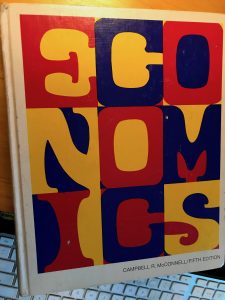Two economists were just awarded the 2018 Nobel Prize in Economics. Of course that isn’t a newsflash, because it happens every year, but the work for which they were recognized is both newsworthy and urgent. The dwindling window of opportunity to decarbonize the global economy and literally save the biosphere, combined with the fact that some economists are plying their trade to help solve that problem is encouraging. I did an economics degree back in the 1970’s (and was never going to win a nobel in economics!). Cementing my mistrust of “education” (versus “learning”), my degree completely ignored the “cost” side of the GDP ledger. I kid you not when I quote this line in my intro to macroeconomics textbook– natural resources are the “free gifts of nature.” I was expected to believe this uncritically all the while my professors pounded the phrase “there ain’t no free lunch” into our young brains. 
People who argue against solar power and renewable energy often claim that it “just isn’t economic.” Nordhaus at Yale has done groundbreaking work on the price of carbon, and to him his due with this recognition. I hope that the Nobel news will raise the awareness that the cost is high (that “lunch” is NOT free by any means). My gut says the Nordhaus numbers are WAY low and other academics think so too. Indeed, philosophically, can we even price this since a “hot house” planet won’t be a nice place to live. That’s why we keep working for solar at schools, houses of worship, homes, and public places. We know that to be sensible, urgent and economic! We’re all economists.